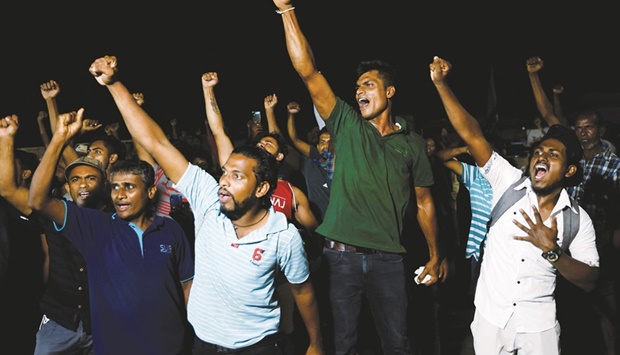Known as “The Terminator” to family and foes alike for his ruthless crushing of Tamil rebels to end a decades-long civil war, when Sri Lanka’s Gotabaya Rajapaksa ended his own presidency he did it from a safe haven.
His no-holds-barred military offensives once drove thousands to seek asylum abroad, but yesterday the 73-year-old e-mailed in his resignation from Singapore.
Rajapaksa, one of a clan of four brothers who have dominated the country’s politics in recent years, was defence secretary under his brother Mahinda’s presidency from 2005 to 2015.
He has denied allegations that at least 40,000 minority Tamil civilians were killed by troops under his command during the closing months of the war.
He was also considered the architect of “white van” abductions under Mahinda, when dissidents and journalists were abducted in ubiquitous white vans and disappeared.
But the accusations bolstered his tough-guy image in the eyes of some in the majority Sinhalese community, who offered him their overwhelming support in the 2019 elections.
Rajapaksa submitted his resignation less than three years into his rule — the first leader to resign since the South Asian nation adopted an executive presidential system in 1978.
It came five days after his presidency crumbled, when tens of thousands of protesters overran his official residence, and a day after he left his country for the neighbouring Maldives.
That hasty exit followed months of demonstrations demanding his resignation over the country’s worst-ever economic crisis, triggered by the coronavirus pandemic but exacerbated by mismanagement.
The former soldier marketed his lack of political expertise as a virtue, but Tamil legislator Dharmalingam Sithadthan said what Rajapaksa projected as his strength was actually the opposite.
“His lack of political knowledge showed in the way he worked,” Sithadthan told AFP. “He flip-flopped from one crisis to another.
“Every time I met with him, he would say he is focused on the economy and law-and-order, but he failed in both.”
Rajapaksa came to power on a manifesto promising “Vistas of Prosperity and Splendour”. According to the United Nations, the country now desperately needs humanitarian aid.
The coronavirus pandemic hammered tourism and overseas remittances — both mainstays of the economy — leaving it facing a foreign exchange crisis.
The country’s 22 million people have been enduring acute shortages of food, fuel and medicines since late last year, and poverty is spreading. Lengthy power cuts — attributable to a lack of dollars to pay for fuel — have exacerbated people’s suffering. Page 6

People dance as they celebrate the resignation of Sri Lanka’s President Gotabaya Rajapaksa at a protest site, in Colombo, yesterday.
